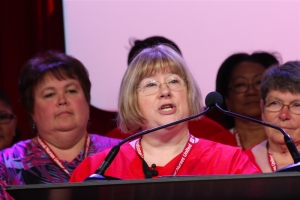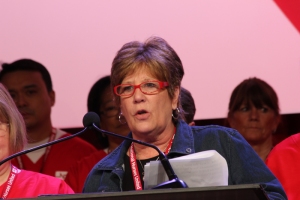Video: More than 70 Minnesota nurses journeyed to San Francisco for the 2013 NNU Staff Nurse Assembly and showed up as one of the biggest collections of delegates.

MNA President Linda Hamilton addressing the SNA crowd about the achievements nurses have made in Minnesota.
While more than 900 nurses came to San Francisco for the 2013 Staff Nurse Assembly, here the world came to them. Minnesota nurses met colleagues from Ireland, Australia, Korea, and Brazil as well as from across the US. They learned that staffing issues and budget cuts are affecting their job quality and their patients’ safety everywhere.
“We’re not alone in our struggles,” said Katie Skipton, “where we’re from, Bemidji, we can sometimes feel it’s just our problem-with staffing especially. It’s a big deal. We’re finding out that we’re not the only ones that are dealing with us, and we’re not the only ones who are fighting. ”
“It’s a global struggle,” said Fairview nurse Barbara Johnson, “and we’re united as brothers and sisters supporting each other.”
In Ireland, for example, an historic financial collapse caused leaders to implement severe austerity measures. The leader of the Irish nurse and midwife association said thousands of nurses lost their jobs. A hiring freeze on new nurses still exists. Patients are more vulnerable there and increasingly at risk. Just knowing that other nurses are fighting the same battles is assuring, nurses say, as well as empowering them and emboldening them to push further.
“Being from a very small town and a small community hospital,” said Jenna Foulk, a nurse from Marshalltown, Iowa, “it’s nice to have a bigger picture of what other nurses have gone though.”
“It’s nice to know that other facilities have the same problems we have,” said Virginia nurse Lora Sandstrom, “and we’re not the only ones who feel this way.”
“If you look at all the nurses in the world, then it becomes an even bigger force and more important that we be advocates for our patients,” said Jodi Hensley, also from Virginia.
Nurses also heard how they’ve come together to implement solutions. In California, nurses have beaten back attempted legislative repeals of ratio laws. In Australia, two territories have implemented minimum ratios. And, in Minnesota, nurses won hospital transparency that forces hospitals to report their staffing plans. What made the difference is nurses collectively fought back.
“It’s not just one person fighting against the problem,” Johnson said, “we can see that there’s thousands of people fighting those problems, and we have a better idea of how to answer those problems.”
”We so much focus on ourselves and our country that we forget that other countries have solved it. And that makes me feel that we should be able to do it,” said Foulk.
“It’s great to see all these nurses from across the country and know we have each others’ backs,” said Courtney Lucht, a nurse at Fairview, “we’ve been able to work with our legislatures and pass some bills that are really going to affect Minnesotans for the next decade.”

MNA Vice President Bunny Engeldorf addresses the SNA crowd about the achievements of Minnesota nurses.
“We want to make it better here,” said Kathy Winger, a Bemidji nurse, “and we can because we care about our patients, our families, our children, and grandchildren.”
Nurses from Minnesota and all over the world came together on the Golden Gate Bridge. In a literal exercise of solidarity, nurses marched from San Francisco to Marin County to protest the Keystone XL pipeline that will carry dirty tarsands crude oil from Canada to various refineries-link to video of march: http://youtu.be/nZWHF9gM3qc
“You walk across the bridge, and it’s a sea of red,” said Mercy Hospital nurse Cassandra Hamilton, “then you look back and the bridge is still completely full. And you get started on coming back, and the bridge is still full. It was amazing. Just goes to show why we’re the most trusted profession.”

More than 900 nurses joined other unions and environmental groups in a march across the Golden Gate Bridge to protest the Keystone XL pipeline.
In educational seminars, nurses heard about tactics to push for better contracts and better patient care, such as petitions, gauntlets of nurses greeting management, and marches on the boss. In Ireland, nurses pushed for policies that dictate only RNs can wear black or white scrubs so patients know who is a Registered Nurse and who isn’t. DC nurses collected a wagonfull of 1500 concern for safe staffing forms to show the media the threat of unsafe staffing. Other ideas included buttons that read, “Registered nurse, NOT Robot nurse.”
Minnesota nurses have already implemented many of these tactics, and they’ve used them to support fellow bargaining units. In Duluth, St. Mary’s nurses were joined by Virginia and Superior nurses for the first day of bargaining. In greater Minnesota, Bemidji nurses went to Thief River Falls to support fellow Sanford nurses.
“You can face those problems alone, or you can face it together,” said Bemidji nurse Peter Danielson, “we know when we stand up and we’ve kept something bad out of another contract, we have a good chance of keeping it out of our contract.”
Staff Nurse Assembly allowed nurses to take that solidarity and extend past their unit, past their hospital, and even beyond their state. They cheered for each victory as if it were their own.
“I feel more solidarity here,” said Liz Binkert from Bemidji, “ it feels good to know there’s people supporting us. I definitely learned the lesson of what good nurses can do for your state.”
NOTES ON NURSING
Approaching Death A nurse goes from the ER to a hospice, and changes the way she thinks about life and its end.
AACN Issues Practice Alert on Alarm Management A new practice alert from the American Association of Critical-Care Nurses outlines evidence-based protocols to reduce false or non-actionable alarms and improve the effective use of these monitoring aids.
LABOR UPDATES
Supreme Court Weakens Chances of Workers Winning Employment Discrimination Cases By restricting who counts as a supervisor, the Court has handed employers a victory.
HEALTH CARE NEWS
Health of U.S. Children Improves, But More Live in Poverty ”The progress we’re seeing in child health and education is encouraging, but the economic data clearly speak to the considerable challenges we still face,” said Laura Speer, associate director for policy reform and data for the foundation.
NOTES ON NURSING
 Nurses Take Activism Beyond the Bedside Nurses and environmental activists from across the U.S. are joining hands this week to step up the message that there is still time to stop the Keystone XL Pipeline before it stops all of us.
Nurses Take Activism Beyond the Bedside Nurses and environmental activists from across the U.S. are joining hands this week to step up the message that there is still time to stop the Keystone XL Pipeline before it stops all of us.
St. Louis University Hospital RNs Win First Contract Registered nurses at Saint Louis University Hospital (SLUH) have won their first ever collective bargaining agreement with a new three year contract that provides for significant improvements in patient care protections, compensation, and job protections.
HEALTH CARE
AMA Recognizes Obesity as a Disease Experts in obesity have struggled for years to have obesity recognized as a disease that deserves medical attention and insurance coverage as do other diseases. Previously the AMA and others have referred to obesity as “a major public health problem.”
Wiser Medication Use Could Cut Health Care Costs If doctors and patients used prescription drugs more wisely, they could save the U.S. health care system at least $213 billion a year, by reducing medication overuse, underuse and other flaws in care that cause complications and longer, more-expensive treatments, researchers conclude.
Non-Profit Launches Campaign to Reach Uninsured The “Get Covered America” campaign will include door-to-door visits by volunteers, brochures handed out at farmers markets and churches and, possibly, partnerships with sports leagues and celebrities, said Anne Filipic, a former White House official who recently became president of Enroll America, the group sponsoring the campaign.
LABOR UPDATES
50 Years of Recessionary-Level Unemployment in Black America August 28 will mark the 50th anniversary of the March on Washington for Jobs and Freedom, the setting of Martin Luther King Jr.’s “I Have a Dream” speech. In 1963, civil rights activists were keenly aware that blacks were suffering disproportionately from high unemployment, and, therefore, one of the demands of the march was for a jobs program that would provide a job to every American who wanted to work. As this recent EPI report explains, we have not yet achieved this goal and blacks have persistently endured what can be considered a “permanent recession.”
LABOR UPDATES
OSHA To Investigate 2nd Plant Explosion in Louisiana OSHA had cited the company for 14 alleged safety and health violations, 12 of which were described by the agency as serious.
HEALTH CARE
FBI: Chicago Patients Suffer as For-Profit Hospital Frauds Medicare “This complaint alleges the hospital and doctors were performing unnecessary invasive surgery to justify false billing.”
Children’s Hospitals Well-Positioned to Handle Reform Standalone children’s hospitals have the financial fortitude to take reform challenges head on, according to a report from Fitch Ratings.
NOTES ON NURSING
Fewer Nurses, More Assistants in Montreal OR At the end of that presentation, Richard Fahey, MUHC director of public affairs, handed journalists a USB stick containing nearly 600 pages of budget documents that spell out the cuts. Buried in those documents are plans to increase the use of nursing assistants in the ORs and other departments.
First there was the crowd. Then there were the signs. Then there were the red uniforms that adorned every man, woman, and child in the auditorium. The scene was set for a champion sports team to walk in the room, but this huge crowd was there to see the contract negotiators. When they entered the room, more than 225 nurses and their families cheered and applauded to show solidarity with their elected bargaining team at the Essentia-St. Mary’s contract talks and bid good morning to management’s team. In the end, nurses won an agreement with management they could say is the result of hard work by the negotiating team, but also because nurses showed Essentia that nurses are united and strong.
“It was fabulous-awesome, just awesome,” said Mary Kirsling, RN, a member of the nurse negotiating team, “I was overwhelmed by the turnout. We exceeded our expectations.”
Nurses at St. Mary’s used their well-established Member Action Teams (MATs) to map out the entire hospital. They mobilized nurses to show up for the first day of negotiations using constantly refined lists of nurse’s names, emails, and phone numbers. With the MAT data, nurses estimate they talked to 80 percent of all the nurses in the hospital just over the last 10 days.

State legislators Jason Metsa and Erik Simonson of Duluth also showed up to show their support for negotiating nurses.
“We had people who were designated to come up and talk to people and commit to be here,” Kirsling said, “almost everyone in the house, every unit has a representation steward, and so they would talk to all the people in their unit and get five people to commit to be here.”
Essentia nurses got a bonus too. They supported St. Luke’s nurse contract bargaining team two months ago. Now the St. Luke’s team showed up to repay the favor.
“Nurses from St. Luke’s and people from Virginia, that’s a long way to drive and it’s nice to feel that support,” Kirsling said. “We’re going to show support for each other and we stand a lot more united today than we ever have in the history of MNA here. In the state, I think we feel a lot more solidarity with each other.”
Nurses knew from talking to each other that there was a lot riding on this contract. While wages are the main item on the table, Kirsling said nurses are standing together for time off to be properly educated to take care of their patients. Her fellow bargaining team member agreed.
“Nurses can’t just wing it everyday, and you don’t want to wing it for our patients. That’s not conducive to patient safety or good patient care,” said Kellie Brickson, RN, at Miller-Dwan, “you want educated nurses. We have to be ready to take care of whatever situation comes in.”
Brickson and Kirsling mentioned the constantly changing state of technology as an issue that nurses fight to stay on top of.
“If we were given time to do our required education away from patient care, that would help us. Sometimes we’re told that we just need to do it on downtime and we don’t always have downtime,” Brickson said.
“I don’t know if there’s a day gone by in my nursing career of some 42 years that I haven’t learned something,” Kirsling said.
“We are here to settle our contract because it’s important for our patients and for safe patient care. We would like to get good language so that we are better able to serve our patients and keep our patients safe,” Brickson added.
The huge turnout for the team showed that wheels are in motion to get that.
“I think it totally set the stage. Our CNO walked in and saw all those people with red on and knew that it wasn’t just 8 of us sitting at the table,” Kirsling said, “there’s thousands of us sitting at that table.”
On the afternoon of June 11, after nearly 33 straight hours of negotiations, the nurses bargaining team reached a tentative agreement with Essentia Management. The elected RN negotiating team unanimously recommends the agreement to the bargaining unit. Details include:
Operating Room Nurses at First Light Health System in Mora started turning up in red lipstick while other nurses wore red scrubs to show support as negotiations began on a new contract. Some nurses who couldn’t wear red expressed their solidarity with the bargaining leaders by dressing up their scrubs with a little red flare.
Negotiations began two weeks ago with nurses asking for more seniority rights, addressing scheduling issues, improvements in on-call pay and on-call process, and the use of remaining sick and vacation pay to be used to pay for continuing health coverage for retirees.
Bargaining Chair Margie Odendahl said they’re working to get more first choice shifts for senior nurses and for a percentage of on-call time to count towards seniority.
Nurses also demand that management hold to agreements the staffing committee has already worked out, such as no Friday shifts scheduled when a nurse has that weekend off-unless a nurse is called and asked to come in.
Odendahl has been part of the negotiating team for five contracts at the Mora hospital, and she’s seeing nurses get more involved and engaged than ever before.
“More than I expected. Even with just 60 nurses in our unit. They are more engaged and willing to stand together to achieve a fair contract,” and she added that “nurses are saying if by standing together we can improve our contract and also improve patient care then , “let’s go for it.”
Negotiations continue in July.
NOTES ON NURSING
NY Bill Would Mandate Hospital Nurse Staffing Advocates say required staffing of one nurse for every two intensive-care patients and 1-to-4 ratios in regular medical-surgical units will improve patient care, reduce deaths, complaints and readmissions and leave hospitals financially intact.
MA Nurses Ratify Contract with Assignment Limits Highlights of the agreement include contractually guaranteed limits on nurses’ patient assignments for nurses working on the medical surgical units, including no more than five patients on days, an average of five patients on evenings and a mix of five and six patient assignments for nurses on nights.
Nurses Say High Sick and Overtime Costs Related to Nursing Shortages Fewer, more stressed staff caring for sick patients means more workers get sick, she said, adding others work overtime to pick up the slack, causing more sickness — so the cycle continues.
HEALTH CARE
Top Health Insurance Bosses Earn Millions The highest-paid executive at each of the “Big Five” health insurers — UnitedHealth Group, Aetna Inc., WellPoint Inc., Humana Inc. and Cigna Corp. — made more than $8 million each in 2012, according to filings this spring with the Securities and Exchange Commission.
LABOR UPDATES
U.S. Job Market Still Worse Than at Any Point During the Last Downturn Right now, according to Bureau of Labor Statistics, there’s approximately one job opening for every 3.1 unemployed persons who are looking for work. That ratio of jobs to jobless has improved an enormous amount since 2009. But to put things in perspective, it’s still worse than it was at any point during the last downturn, which started in 2001.
More than 225 nurses and supporters from St. Mary’s, Miller-Dwan, Virginia, and Superior hospitals showed up to welcome both nurse and management bargaining teams to the negotiating table as contract talks began Monday morning. Nurse Kellie Brickson read an opening statement to management on behalf of MNA nurses.
Negotiations continue as of Tuesday morning.